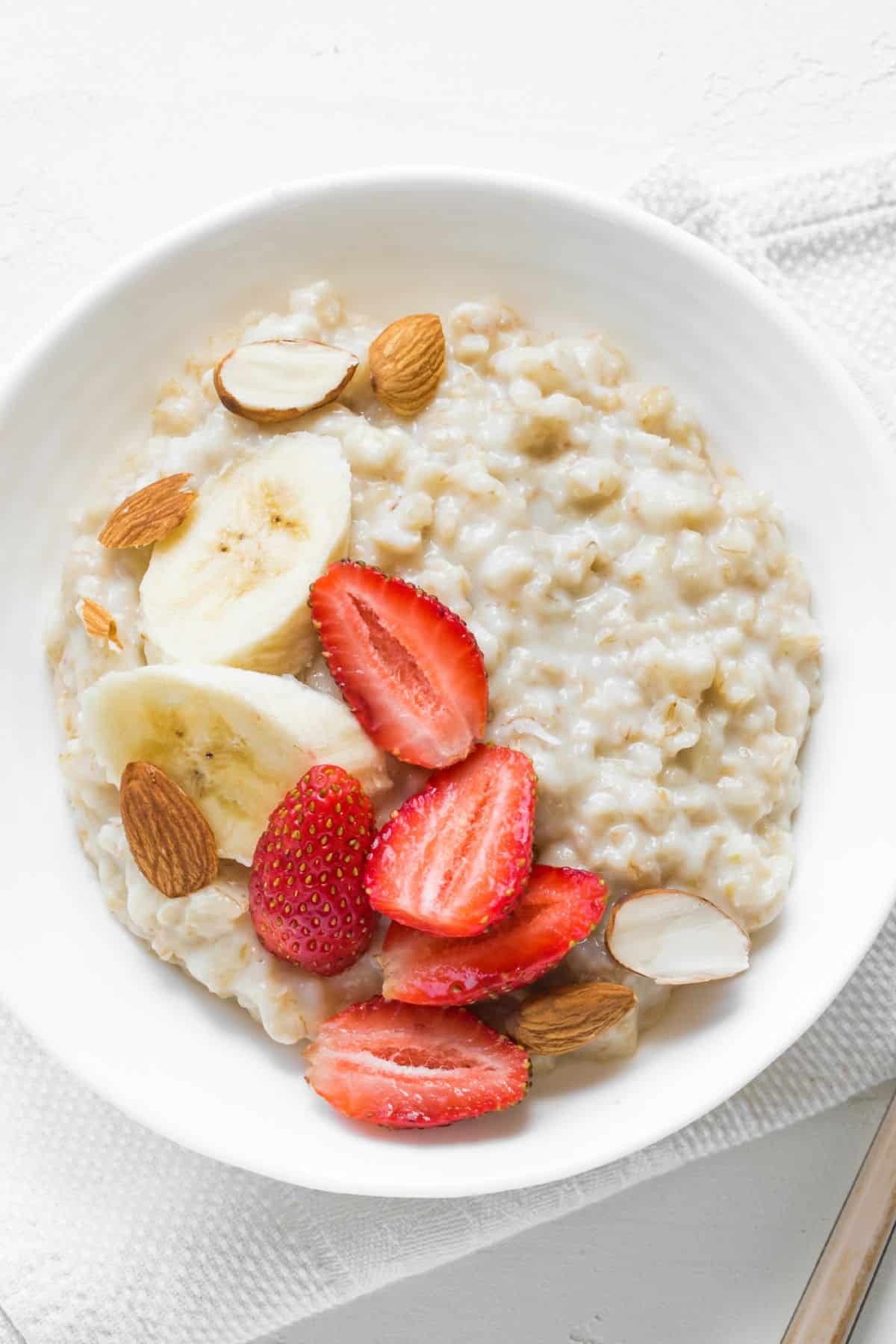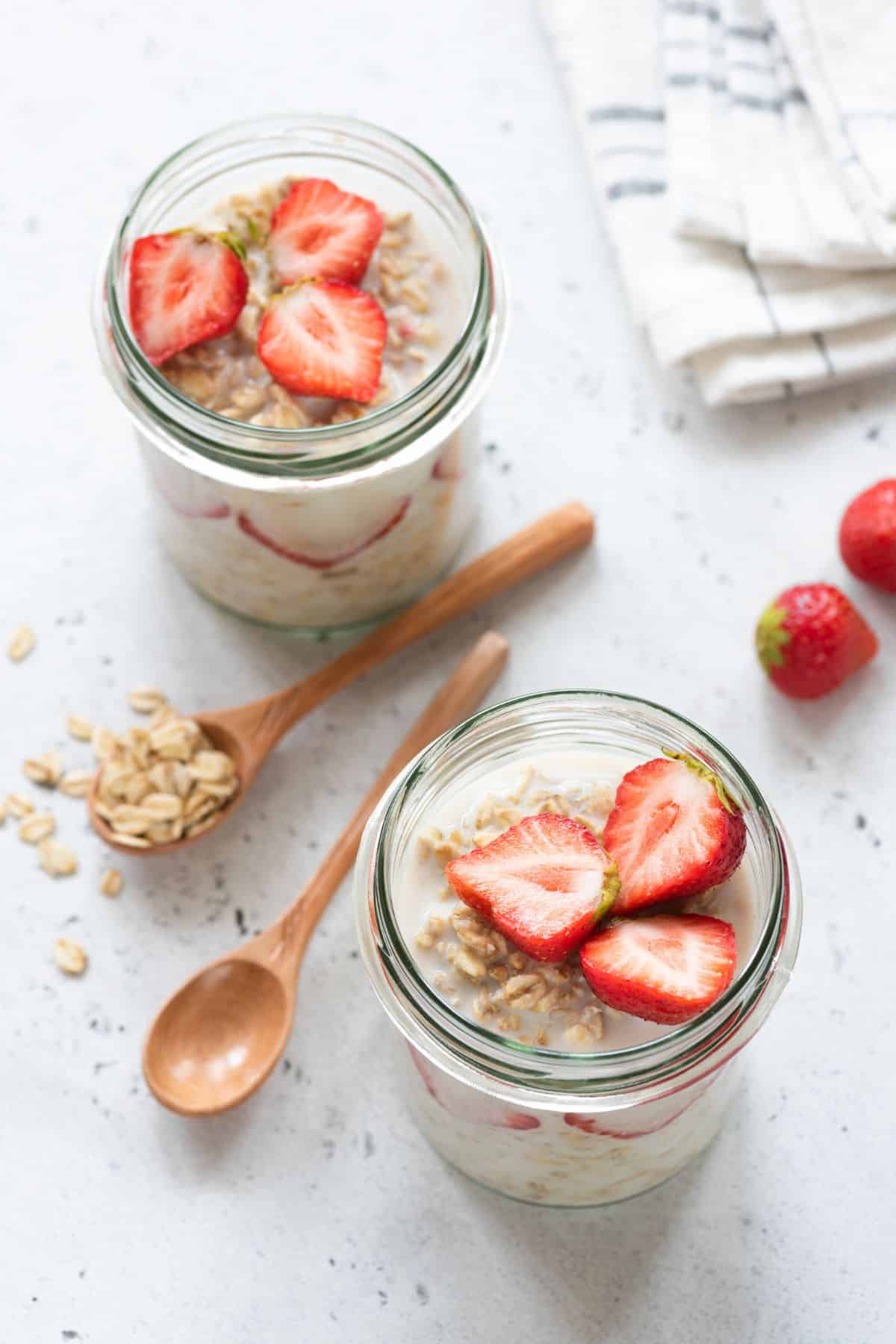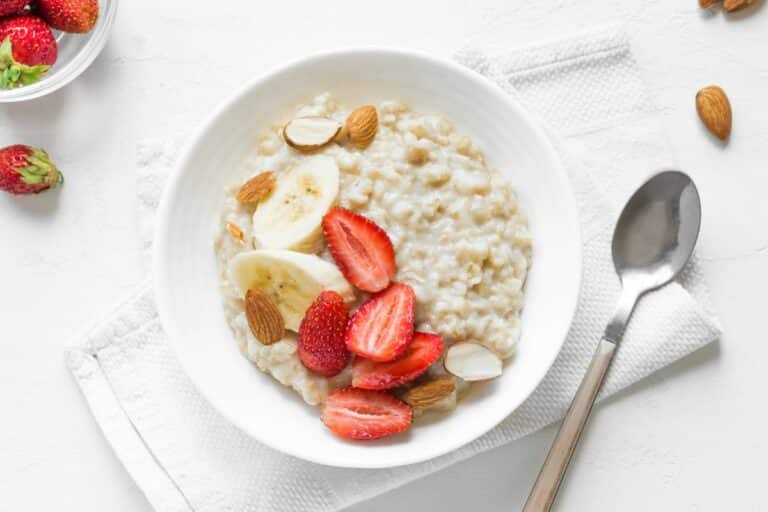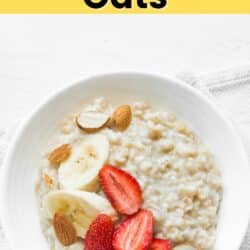5 Ways Oatmeal Causes Bloating (Plus How to Reduce Symptoms)
Oatmeal can be a nourishing food, but it may also cause unpleasant symptoms like bloating. In this article, I share the reasons why oatmeal can cause bloating and some natural ways to reduce bloating from oatmeal.

Oatmeal is a common breakfast food with some potential health benefits including boosting the immune system and reducing the risk of heart disease.
But, some people might find that eating oats (and other whole grains) can cause digestive discomfort, including stomach bloating.
In this article, I’ll share some of the reasons why oats can lead to bloating, how to reduce the risk of bloating, and a recipe for a “tummy-friendly” oatmeal recipe using soaked oats!
Reasons Why Oatmeal Can Cause Bloating
First, let’s jump into some reasons why eating oats can lead to bloating, especially in the stomach after eating.
1. High Fiber Content
Oatmeal is high in fiber, particularly soluble fiber, which can be difficult to digest for some people. When this fiber reaches the large intestine, it can be fermented by bacteria, which can produce gas and cause bloating.
This can be the case for other high-fiber foods as well, and not just oatmeal.
2. Lactose Intolerance
Some types of oatmeal may contain added milk or other dairy products, which can be problematic for people who are lactose intolerant. Lactose intolerance means the body can’t break down lactose properly, which can cause bloating, gas, and other digestive symptoms.
The good news is that oatmeal can easily be prepared without dairy or milk. Try using water or non-dairy milks like almond milk to prepare your cup of oats.
3. Gluten Sensitivity
Although oats themselves don’t contain gluten, they are often processed in facilities that also process wheat and other gluten-containing grains. This can lead to cross-contamination and may cause issues for people with gluten sensitivity, gluten intolerance, or celiac disease.
In this case, you can purchase certified gluten-free oats which do not have the cross-contamination warning. Speak to your healthcare provider if you are on a gluten-free diet to make sure that oats are okay for you, even gluten-free oats.
4. Sugar Content
Some types of oatmeal may contain added sugars, which can contribute to bloating, high blood sugar levels, and other digestive issues. This is usually the case in instant oatmeal or other pre-prepared cups of oats.
To avoid too much added sugar, try preparing your oatmeal with a ripe banana instead! Add a drizzle of maple syrup if you need more sweetness.
5. Eating Too Quickly
Eating too quickly can cause you to swallow air, which can lead to bloating and gas. It’s important to take your time when eating, chew your food thoroughly, and avoid talking while eating.
Eating slower is good practice for the digestive system and digestive tract, giving it time to release the necessary digestive enzymes to help break down the fibers before entering the stomach and small intestine.
How to Reduce Bloating From Oatmeal
1. Increase Fluid Intake
Drinking plenty of water can help to flush out excess gas and relieve bloating.
Aim to drink at least 8-10 glasses of water per day, or enough so that your urine is light in color.
2. Start with Smaller Portions
If you find that eating a large bowl of oatmeal causes bloating, try starting with a smaller portion and gradually increasing it over time.
This will allow your body to adjust to the high-fiber content more slowly and hopefully reduce symptoms of bloating with eating too much oatmeal.

3. Chew Thoroughly
Chewing your food thoroughly can help to break it down more effectively, which can reduce the amount of gas produced during digestion. This is a good habit for overall digestive health.
4. Try Low-FODMAP Oatmeal
Oatmeal is a low-FODMAP food, which means it contains relatively low levels of fermentable carbohydrates that can contribute to bloating.
Look for oatmeal that is labeled as low-FODMAP or try adding low-FODMAP toppings, such as fresh fruit like bananas or blueberries.
5. Avoid Adding Trigger Foods
Adding high-fat or high-sugar toppings to your oatmeal can exacerbate bloating.
Instead, try adding low-fat dairy products, such as skim milk or yogurt, or low-sugar options like cinnamon or nuts.
6. Soak Your Oats
Soaking oats before cooking or eating them may also help to reduce bloating for some people. I’ve included a recipe below for exactly how to make overnight oats using plain oatmeal.
Soaking oats in water or milk overnight can help to break down some of the complex carbohydrates and make them easier to digest. This can reduce the amount of gas produced during digestion and help to alleviate bloating.
More Helpful Resources About Bloating
Here’s a recipe that I find helps with oatmeal and bloating.
That said, if you have irritable bowel syndrome, inflammatory bowel disease, or other types of gut health issues, you may wish to consult a registered dietitian or other health professional to determine the best way to prepare oatmeal.

Tummy-Friendly Soaked Oats Recipe
This recipe is packed with tummy-friendly ingredients like soaked oats, which are easier to digest, almond milk, which is low in lactose, and chia seeds, which are a good source of fiber and healthy fats. The mashed banana adds natural sweetness and a boost of potassium, while the cinnamon adds a warm, comforting flavor. Feel free to adjust the sweetness and toppings to your liking, and enjoy a healthy and delicious bowl of oatmeal without the bloating!
- Total Time: 20 Minutes
- Yield: 2 Servings 1x
Ingredients
- 1 cup old-fashioned rolled oats (use gluten-free oats for gluten-free diets)
- 2 cups water
- 1/2 cup unsweetened almond milk
- 1 banana, mashed
- 1/2 teaspoon cinnamon
- 1 tablespoon chia seeds
- 1 tablespoon honey or maple syrup (optional, for extra sweetness)
Instructions
- In a large bowl, mix together the rolled oats and water. Cover the bowl with a lid and place it in the fridge overnight to soak.
- In the morning, remove the oats from the fridge and drain off any excess water.
- In a medium saucepan, combine the soaked oats, almond milk, mashed banana, and cinnamon. Heat the mixture over medium heat, stirring occasionally, until it comes to a boil.
- Reduce the heat to low and simmer the oatmeal for 5-7 minutes, stirring occasionally, until it reaches your desired consistency.
- Remove the oatmeal from the heat and stir in the chia seeds and honey (if using). Serve immediately.
Notes
- This recipe can easily be doubled for extra servings.
- Some people believe that adding a teaspoon of vinegar to the oats will further help them become easier to digest. If you add vinegar to the oats and water, you may wish to rinse the oats in a fine-mesh strainer before cooking.
- Be sure to use certified gluten-free oats if you are on a gluten-free diet.
- Prep Time: 10 Minutes
- Cook Time: 10 Minutes
- Category: Breakfast
- Method: Stovetop
- Cuisine: Healthy
- Diet: Vegetarian
Nutrition
- Serving Size: 1/2 of recipe
- Calories: 278
- Sugar: 7.2 g
- Sodium: 57.7 mg
- Fat: 2.9 g
- Saturated Fat: 0.8 g
- Carbohydrates: 48.8 g
- Fiber: 8.9 g
- Protein: 7.9 g
- Cholesterol: 0 mg
Don’t forget to join my newsletter list to get exclusive clean eating recipes and tips. The newsletter is 100% free with no spam; unsubscribe anytime.
About the Author: Carrie Forrest has a master’s degree in public health with a specialty in nutrition. She is a top wellness and food blogger with nearly 10 million annual visitors to her site. Carrie has an incredible story of recovery from chronic illness and is passionate about helping other women transform their health. Send Carrie a message through her contact form.
Note: this post is for informational purposes only and is not intended as medical advice. Please consult your healthcare provider for recommendations related to your individual situation.





















This is the only way I prepare oatmeal now!